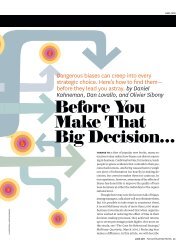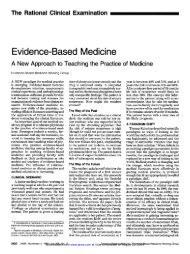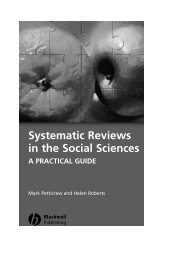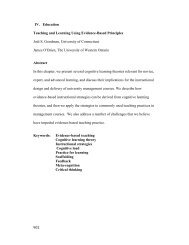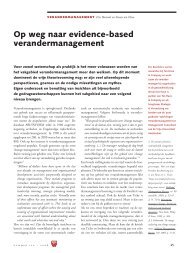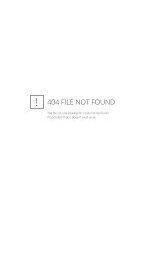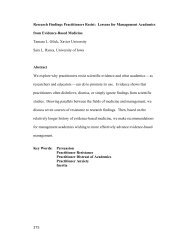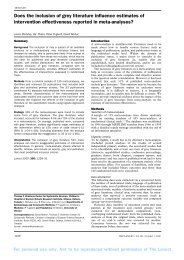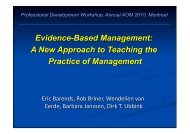Reflections of Teaching Evidence-Based Management - Center for ...
Reflections of Teaching Evidence-Based Management - Center for ...
Reflections of Teaching Evidence-Based Management - Center for ...
Create successful ePaper yourself
Turn your PDF publications into a flip-book with our unique Google optimized e-Paper software.
independent <strong>of</strong> our ef<strong>for</strong>ts to understand it; and that observations, facts, andconcepts (our lay term <strong>for</strong> “constructs”) are subjective and value-laden, but notcompletely fallible (Rousseau et al., 2008; Shadish et al., 2002). We differentiatebetween meta-analyses and other <strong>for</strong>ms <strong>of</strong> systematic reviews as examples <strong>of</strong>high-quality evidence, and opinion-pieces (expert or non-expert) as examples <strong>of</strong>weak evidence. However, evidence hierarchies, if presented, are inclusive <strong>of</strong>research designs (e.g., case studies; descriptive research; quasi-experimentalinvestigations) that may be applicable <strong>for</strong> some questions, entities, or stages <strong>of</strong>knowledge development. Triangulation across methods and theoretical pluralismare valued, consistent with a critical realist perspective (Rousseau et al., 2008).Learning to plan one’s own research and critically appraise others’research are complementary learning experiences. We encourage criticalappraisal <strong>of</strong> evidence from all four EBMgt elements (Briner et al., 2009). Wedescribe to students various ways <strong>of</strong> acquiring knowledge (e.g., personalexperience, tradition, authority, <strong>for</strong>mal research) and associated strengths andlimitations. Whereas personal experience is valuable and will in<strong>for</strong>m managerialdecision-making, an EBMgt perspective requires critical reflection upon thatsource, as well as the others. For example, the Absenteeism Diagnosis exercise,discussed previously, includes questions adapted from Briner and Rousseau(2011) such as, “What are my beliefs about the causes <strong>of</strong> absence?” and “Howrelevant and applicable is my experience?” Such questions are designed toencourage critical appraisal <strong>of</strong> personal experience. An additional question,“Have I developed an ‘expert’s intuition’ (vs. a ‘gut feel’)?” has been used in1024



